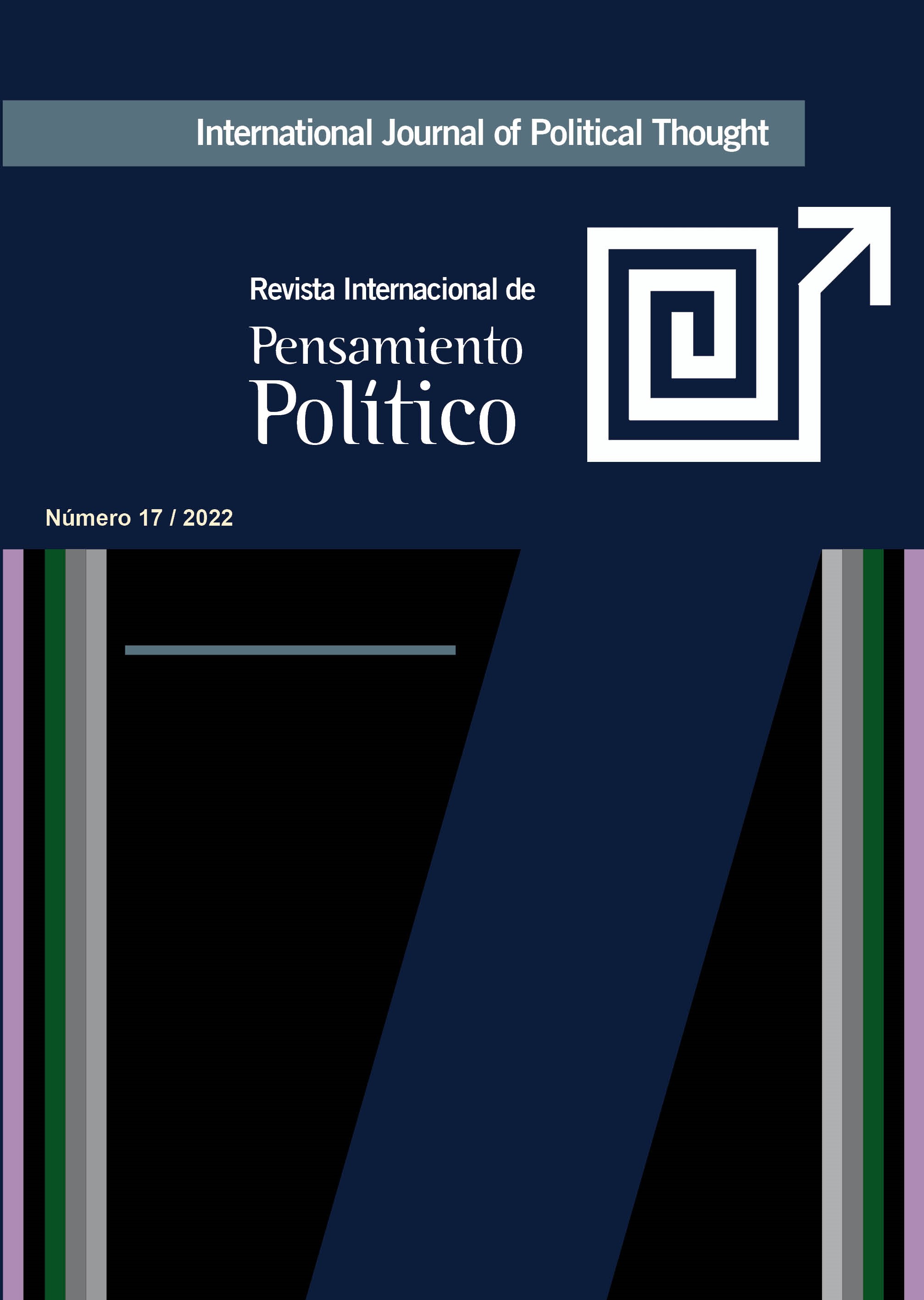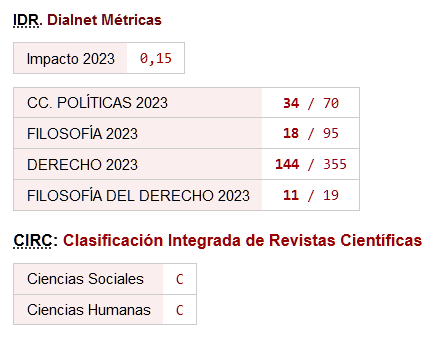Freedom of movement, exclusion of immigrants, and the right to travel
DOI:
https://doi.org/10.46661/revintpensampolit.7542Keywords:
right to travel, right to exclude, migration, freedom of movement, open borders, ethics of migrationAbstract
Discussions on human mobility tend to focus on migration as settlement, ignoring travel and short-term stays. The objective of this article is twofold. The first has to do with the need to distinguish both phenomena. To this end, it proposes to conceive of travel as conceptually and normatively separate from migration. With this distinction in mind, the second objective is to defend the right to travel, based on the instrumental and intrinsic value of freedom of movement. Once we understand mobility as the norm, we will be in a position to establish the exceptions that delimit its exercise. We then proceed to examine the arguments in favor of migration controls, concluding that they do not stand up against the right to travel. The article responds to two additional objections: that of the unauthorized extension of the stay as a form of concealed migration, and that of the arbitrariness in the distinction between short- and long-term travel. Finally, we consider some situations in which the right to travel could be legitimately restricted.
Downloads
References
Bauböck, R. (2009). “Global Justice, Freedom of Movement and Democratic Citizenship”, European Journal of Sociology, vol. 50, 1-31. https://doi.org/10.1017/S000397560900040X
Blake, M. (2001). “Distributive justice, state coercion, and autonomy”, Philosophy & Public Affairs, vol. 30, n.º 3, 257-296. https://doi.org/10.1111/j.1088-4963.2001.00257.x
Blake, M. (2005). “Immigration”, en Frey, R. G. y Wellman C. H. (eds.), A companion to applied ethics, Malden, Blackwell Publishing Ltd, 224-237.
Blake, M. (2013). “Immigration, jurisdiction, and exclusion”, Philosophy & Public Affairs, vol. 41, n.º 2, 103–130. https://doi.org/10.1111/papa.12012
Blake, M. (2014). “The right to exclude”, Critical Review of International Social and Political Philosophy, vol. 17, n.º 5, 521-537. https://doi.org/10.1080/13698230.2014.919056
Carens, J. (2013). The ethics of immigration, Nueva York, Oxford University Press.
Cole, P. (2000). Philosophies of Exclusion: Liberal Political Theory and Immigration, Edimburgo, Edinburgh University Press.
Department of Homeland Security (2020). Fiscal year 2019 entry/exit overstay report. Recuperado el 20 de mayo de 2022 de: https://www.dhs.gov/sites/default/files/2021-12/CBP%20-%20FY%202020%20Entry%20Exit%20Overstay%20Report_0.pdf
Fine, S. (2010). “Freedom of Association Is Not the Answer”, Ethics, vol. 120, n.º 2, 338-356. https://doi.org/10.1086/649626
Fine, S. (2013). “The Ethics of Immigration: Self-Determination and the Right to Exclude”, Philosophy Compass, vol. 8, n.º 3, 254-268. https://doi.org/10.1111/phc3.12019
Hidalgo, J. (2019). Unjust Borders: Individuals and the Ethics of Immigration, Nueva York, Routledge.
Huemer, M. (2010). “Is there a right to immigrate?”, Social Theory and Practice, vol. 36, n.º 3, 429-461. https://doi.org/10.5840/soctheorpract201036323
Instituto Nacional de Estadística (2019). Cuenta Satélite del Turismo de España (CSTE). Revisión estadística 2019. Recuperado el 20 de mayo de 2022 de: https://www.ine.es/prensa/cst_2018.pdf
Kant, I. (1998). Sobre la paz perpetua, Madrid, Editorial Tecnos.
Kukathas, C. (2021). Immigration and Freedom, Princeton, Princeton University Press.
Lægaard, S. (2010). “What is the Right to Exclude Immigrants?”, Res Publica, vol. 16, n.º 3, 245-262. https://doi.org/10.1007/s11158-010-9122-2
Lenzen, M. et al. (2013). “The carbon footprint of global tourism”, Nature Climate Change, vol. 8, n.º 6, 522-528. https://doi.org/10.1038/s41558-018-0141-x
Loewe, D. (2020a). “Cuando la libertad importa: inmigrantes y movilidad libre”, Estudios Públicos, n.º 157, 7-46. https://doi.org/10.38178/cep.vi157.3
Loewe, D. (2020b). “Cuestionando la relación entre libertad de asociación y el derecho de excluir a los inmigrantes: tres argumentos en contra de la tesis de Ch. H. Wellman”, Bajo Palabra, n.º 23, 187-210. http://dx.doi.org/10.15366/bp.2020.23.007
Miller, D. (2016). Strangers in our midst. The political philosophy of immigration, Cambridge, Harvard University Press.
Nagel, T. (2005). “The Problem of Global Justice”, Philosophy & Public Affairs, vol. 33, n.º 2, 113-147. https://doi.org/10.1111/j.1088-4963.2005.00027.x
Nine, C. (2019). “Do territorial rights include the right to exclude?”, Politics, Philosophy & Economics, vol. 18, n.º 4, 307-322. https://doi.org/10.1177/1470594X18788345
Niño Arnaiz, B. (2021). “Mugak, harresiak eta giza mugikortasuna: marko teoriko-normatiboa”, Inguruak. Revista Vasca de Sociología y Ciencia Política, n.º 71, 50-72. http://dx.doi.org/10.18543/inguruak-71-2021-art04
Niño Arnaiz, B. (2022a). “Ética de las migraciones, fronteras y movilidad humana”, Oxímora. Revista Internacional de Ética y Política, n.º 21, 1-21. https://doi.org/10.1344/oxi.2022.i21.39374
Niño Arnaiz, B. (2022b). “Should we open borders? Yes, but not in the name of global justice”, Ethics & Global Politics, vol. 15, n.º 2, 55-68. https://doi.org/10.1080/16544951.2022.2081398
Oberman, K. (2016). “Immigration as a Human Right”, en Fine, S. & Ypi, L. (eds.), Migration in Political Theory. The ethics of movement and membership, Nueva York, Oxford University Press, 32-56.
Organización Internacional para las Migraciones (2020). Informe sobre las migraciones en el mundo en 2020. Recuperado el 20 de mayo de 2022 de: https://publications.iom.int/system/files/pdf/wmr_2020_ es.pdf
Organización Mundial del Turismo (s.f.). Glosario de términos de turismo. Recuperado el 20 de mayo de 2022 de: https://www.unwto.org/es/glosario-terminos-turisticos
Pevnick, R. (2011). Immigration and the Constraints of Justice: Between Open Borders and Absolut Sovereignty, Cambridge, Cambridge University Press.
Sager, A. (2016). “Methodological Nationalism, Migration and Political Theory”, Political Studies, vol. 64, n.º 1, 42-59. https://doi.org/10.1111/1467-9248.12167
Sager, A. (2018). Toward a Cosmopolitan Ethics of Mobility: The Migrant’s-Eye View of the World, Cham, Springer. https://doi.org/10.1007/978-3-319-65759-2
Sandelind, C. (2015). “Territorial rights and open borders”, Critical Review of International Social and Political Philosophy, vol. 18, n.º 5, 487-507. https://doi.org/10.1080/13698230.2013.864796
Sheller, M. (2018). Mobility justice: The politics of movement in the age of extremes, Londres, Verso.
Song, S. (2018). “Political Theories of Migration”, Annual Review of Political Science, vol. 21, 385-402. https://doi.org/10.1146/annurev-polisci-082317-093019
Song, S. (2019). Immigration and Democracy, Nueva York, Oxford University Press. https://doi.org/10.1093/oso/9780190909222.001.0001
Torpey, J. (2006). “Yendo y viniendo: la monopolización estatal de los legítimos ‘medios de movimiento’”, Zona abierta, n.º 116-117, 59-88.
Velasco, J. C. (2012). “Fronteras abiertas, derechos humanos y justicia global”, ARBOR. Ciencia, Pensamiento y Cultura, vol. 188, n.º 755, 457-473. https://doi.org/10.3989/arbor.2012.755n3001
Walzer, M. (1993). Las esferas de la justicia. Una defensa del pluralismo y la igualdad, Ciudad de México, Fondo de Cultura Económica.
Wellman, C. H. y Cole, P. (2011). Debating the ethics of immigration: Is there a right to exclude? Nueva York, Oxford University Press.
Downloads
Published
How to Cite
Issue
Section
License
Copyright (c) 2022 Borja Niño Arnaiz

This work is licensed under a Creative Commons Attribution-NonCommercial-ShareAlike 4.0 International License.
Open access policy
Free and open access is allowed to any interested party to all the contents of the journal issues, free of charge, being able to print and transfer all the articles, with the only condition of specifying the source and authorship.
The journal: a) does not charge authorship costs for the processing of articles or for their submission, b) maintains copyright for authors without restrictions, c) facilitates authors to keep their publication rights without limitations.
The International Journal of Political Thought is an original work of the Laboratory of Political Ideas and Practices of the Pablo de Olavide University. All articles included in the Journal are original work of their respective authors. This Journal is freely offered to the scientific and academic community at no cost and releases the contents according to the license "Attribution-NonCommercial-ShareAlike 4.0 CC BY-NC-SA" of the Creative Commons project available in the following url: https://creativecommons.org/licenses/by-nc-sa/4.0/legalcode
If you wish to translate or compile any of the articles available here, please contact us at contacto












 ISSN: 1885-589X
ISSN: 1885-589X  Universidad Pablo de Olavide
Universidad Pablo de Olavide